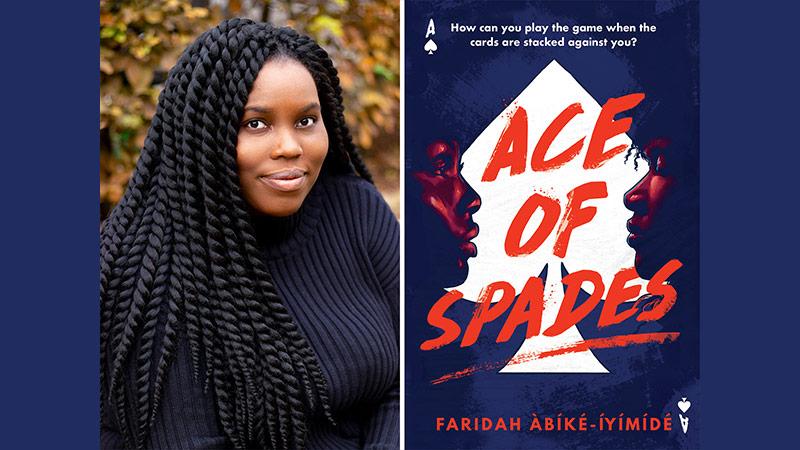Faridah Àbíké-Íyímídé, the author of the award-winning and New York Times international best-selling young adult novel Ace of Spades, joined the final event for this academic year of the University of Westminster’s Black History Year programme on 19 July 2022.

Organised in cooperation with the Queer London Research Forum, the conversation was led by Dr Katherine M. Graham, Senior Lecturer in English Literature from the University of Westminster. During the event, Àbíké-Íyímídé talked about her family background, her journey as a writer, her debut novel and the mentorship programme she runs.
Faridah Àbíké-Íyímídé is a Black, queer, Muslim writer of Nigerian origin. She was born and raised in Croydon, South London, and later moved to the Scottish Highlands to study for an undergraduate degree in English Literature and Chinese Anthropology. Àbíké-Íyímídé has always been intrigued by writing. She wrote her first story at the age of ten, which her primary school teacher found funny, despite being a very serious work. She encouraged her to continue with her passion, so Àbíké-Íyímídé started practising during and between classes. Her mother was also a great influence from a young age. She told her daughter bedtime stories from Nigerian folklore, and even took her to writing workshops, in spite of the family’s financial problems.
Her debut work, Ace of Spades, is a detective/thriller story about two Black queer teenagers, Devon and Chiamaka, who study in a private high school in New York. They are living a perfect student life until an anonymous texter called Aces brings their secrets to light. Even though Devon and Chiamaka are both racially minoritised and part of the LGBTQ+ community, they come from very different financial backgrounds and have very different feelings and reactions to the events around them. Chiamaka is the ‘queen bee’ with high social standing and from a wealthy family background, while Devon is from a working-class family and was inspired by Àbíké-Íyímídé’s upbringing in Croydon. She had quite a few problems with microaggression in Scotland at university, so she wondered what it would feel like to grow up in a space where you are very different from others, with a constant pressure to change, just like in the case of Devon.
The story was billed as ‘Get Out meets Gossip Girl’ for a reason. Àbíké-Íyímídé was inspired by the gossiping person who works in the shadows in Gossip Girl and the horrifying isolation Black people feel in a mostly white community in Get Out. In this novel, she wanted to put Black people in the centre, compared to many young adult stories where the main characters are white, and racially minoritised people only serve as a side or background character. She got into activism through the works of Black American writer James Baldwin and aimed to write about justice and civil rights. As a Black, queer, Muslim woman, she feels that these characteristics are not just separate parts of her as a person, but all of them make her who she is. Àbíké-Íyímídé thinks that these kinds of complex characters deserve more representation.
Ace of Spades is not just about student life and mysteries, but it also points out institutional racism in the academic sphere. According to Àbíké-Íyímídé, education can be a dangerous institution, providing information that is never to be questioned. She encourages everyone to read case studies and human experience stories to get a deeper understanding and new angles on certain topics and issues. As she puts it: “We can’t just trust what we are told, that is the only way to be liberated.” In Ace of Spades, she wanted to share something accessible for young Black people, something fun but educating. She studied Young Adult Studies in her last year at university and believes that many of these works are brilliant but not acknowledged enough.
Àbíké-Íyímídé did not have a mentor during her journey to become a writer. Even so, she received a lot of encouragement from the writer community. She wanted to provide support for other new writers to break into the industry. In 2019, she established Avengers of Colour, a mentorship scheme for un-agented writers of colour, helping them on their journey to get published. “People underestimate how much self-work goes into writing. The biggest challenge as a writer is that you never know how much of your real self is enough. Unpacking yourself is a lifelong struggle” Àbíké-Íyímídé said during the event.
Àbíké-Íyímídé is also a Morris Award 2022 finalist, the winner of the Books Are My Bag 2021 Reader’s Award for Young Adult Fiction, and the winner of the 53rd NAACP Image Awards in the Outstanding Literary Work for Youth/Teens category.
Learn more about Black History Year at the University of Westminster.


